Related Research Articles

Gaius Julius Caesar Augustus, also known as Octavian (Octavianus), was the founder of the Roman Empire; he reigned as the first Roman emperor from 27 BC until his death in AD 14. The reign of Augustus initiated an imperial cult as well as an era associated with imperial peace, the Pax Romana or Pax Augusta, in which the Roman world was largely free of armed conflict aside from expansionary wars and the Year of the Four Emperors. The Principate system of imperial rule established by Augustus lasted until the Crisis of the Third Century.

Tiberius Claudius Caesar Augustus Germanicus was Roman emperor, ruling from AD 41 to 54. A member of the Julio-Claudian dynasty, Claudius was born to Drusus and Antonia Minor at Lugdunum in Roman Gaul, where his father was stationed as a military legate. He was the first Roman emperor to be born outside Italy.

Gaius Caesar Augustus Germanicus, better known by his nickname Caligula, was Roman emperor from AD 37 until his assassination in AD 41. He was the son of the Roman general Germanicus and Agrippina the Elder, Augustus' granddaughter. Caligula was born into the first ruling family of the Roman Empire, conventionally known as the Julio-Claudian dynasty.
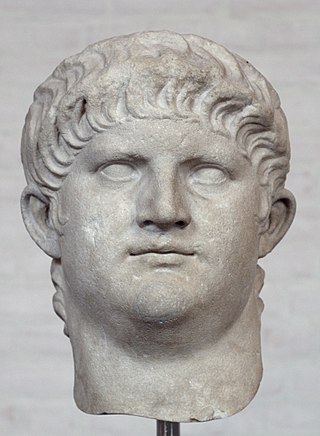
Nero Claudius Caesar Augustus Germanicus was Roman emperor and the final emperor of the Julio-Claudian dynasty, reigning from AD 54 until his death in AD 68.

Tiberius Julius Caesar Augustus was a Roman emperor. He reigned from AD 14 until 37, succeeding his stepfather, the first Roman emperor Augustus. Tiberius was born in Rome in 42 BC. His father was the politician Tiberius Claudius Nero and his mother was Livia Drusilla, who would eventually divorce his father, and marry the future-emperor Augustus in 38 BC. Following the untimely deaths of Augustus' two grandsons and adopted heirs, Gaius and Lucius Caesar, Tiberius was designated Augustus' successor. Prior to this, Tiberius had proved himself an able diplomat, and one of the most successful Roman generals: his conquests of Pannonia, Dalmatia, Raetia, and (temporarily) parts of Germania laid the foundations for the empire's northern frontier.
6 was a common year starting on Friday of the Julian calendar. In the Roman Empire, it was known as the Year of the Consulship of Lepidus and Lucius Arruntius. The denomination "AD 6" for this year has been used since the early medieval period, when the Anno Domini calendar era became the prevalent method in Europe for naming years.
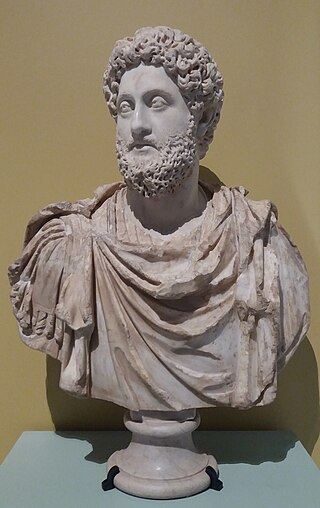
Commodus was a Roman emperor who ruled from 177 to 192. He served jointly with his father Marcus Aurelius from 177 until the latter's death in 180, and thereafter he reigned alone until his assassination. His reign is commonly thought to mark the end of a golden age of peace and prosperity in the history of the Roman Empire.
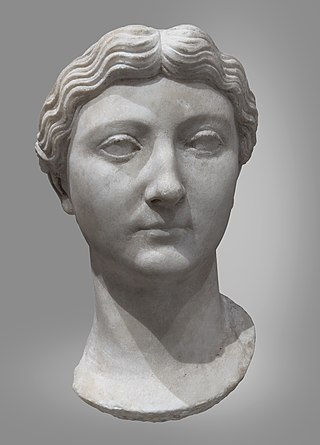
Livia Drusilla was Roman empress from 27 BC to AD 14 as the wife of emperor Augustus. She was known as Julia Augusta after her formal adoption into the Julian family in AD 14.

Lucius Aelius Sejanus, commonly known as Sejanus, was a Roman soldier, friend, and confidant of the Roman Emperor Tiberius. Of the Equites class by birth, Sejanus rose to power as prefect of the Praetorian Guard, of which he was commander from AD 14 until his execution for treason in AD 31.

Gaius Caesar was the grandson and heir to the throne of Roman emperor Augustus, alongside his younger brother Lucius Caesar. Although he was born to Marcus Vipsanius Agrippa and Julia, Augustus' only daughter, Gaius and his younger brother, Lucius Caesar, were raised by their grandfather as his adopted sons and joint-heirs to the empire. He would experience an accelerated political career befitting a member of the Julio-Claudian dynasty, with the Roman Senate allowing him to advance his career without first holding a quaestorship or praetorship, offices that ordinary senators were required to hold as part of the cursus honorum.
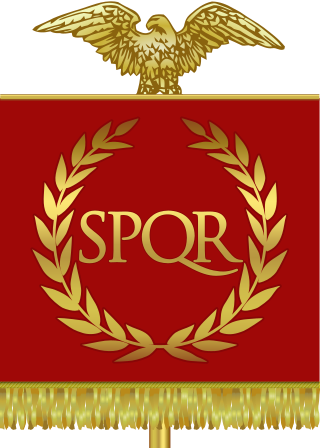
The Roman emperor was the ruler and monarchical head of state of the Roman Empire, starting with the granting of the title augustus to Octavian in 27 BC. The term "emperor" is a modern convention, and did not exist as such during the Empire. Often when a given Roman is described as becoming emperor in English, it reflects his taking of the title augustus and later basileus. Another title often used was imperator, originally a military honorific, and caesar, originally a surname. Early emperors also used the title princeps alongside other Republican titles, notably consul and pontifex maximus.
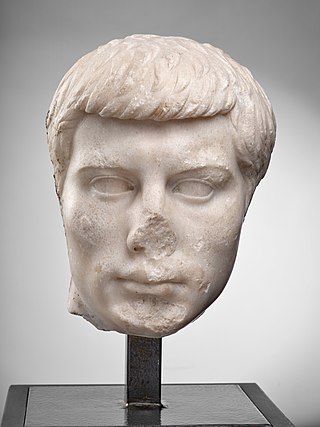
Tiberius Julius Caesar Nero, known as Tiberius Gemellus, was the son of Drusus and Livilla, the grandson of the Emperor Tiberius, and the cousin of the Emperor Caligula. Gemellus is a nickname meaning "the twin". His twin brother, Germanicus Gemellus, died as a young child in AD 23. His father and older cousins died, and are suspected by contemporary sources as having been systematically eliminated by the powerful praetorian prefect Sejanus. Their removal allowed Gemellus and Caligula to be named joint-heirs by Tiberius in 35, a decision that ultimately resulted in Caligula assuming power and having Gemellus killed in late 37 or early 38.

Drusus Julius Caesar was the son of Emperor Tiberius, and heir to the Roman Empire following the death of his adoptive brother Germanicus in AD 19.

Lucius Caesar was a grandson of Augustus, the first Roman emperor. The son of Marcus Vipsanius Agrippa and Julia the Elder, Augustus' only daughter, Lucius was adopted by his grandfather along with his older brother, Gaius Caesar. As the emperor's adopted sons and joint-heirs to the Roman Empire, Lucius and Gaius had promising political and military careers. However, Lucius died of a sudden illness on 20 August 2 AD, in Massilia, Gaul, while traveling to meet the Roman army in Hispania. His brother Gaius also died at a relatively young age on 21 February 4 AD. The untimely loss of both heirs compelled Augustus to redraw the line of succession by adopting Lucius' younger brother, Agrippa Postumus as well as his stepson, Tiberius on 26 June 4 AD.

The Principate is the form of imperial government of the Roman Empire from the beginning of the reign of Augustus in 27 BC to the end of the Crisis of the Third Century in AD 284, after which it evolved into the Dominate.
Lucius Seius Strabo was a prefect of the Roman imperial bodyguard, known as the Praetorian Guard, during the rule of the emperors Augustus and Tiberius. The length of Strabo's tenure as Praetorian prefect is unknown, but he held the position together with various colleagues until 15, after which he was appointed to the governorship of Egypt. With this career Strabo distinguished himself by attaining the two highest offices open to men of the equestrian class in the Roman Empire.

The Constitution of the Roman Empire was an unwritten set of guidelines and principles passed down mainly through precedent. After the fall of the Roman Republic, the constitutional balance of power shifted from the Roman Senate to the Roman Emperor. Beginning with the first emperor, Augustus, the emperor and the Senate were theoretically two co-equal branches of government. In practice, however, the actual authority of the imperial Senate was negligible, as the emperor held the true power of the state. During the reign of the second emperor, Tiberius, many of the powers that had been held by the Roman assemblies were transferred to the Senate.

The Senate of the Roman Empire was a political institution in the ancient Roman Empire. After the fall of the Roman Republic, the constitutional balance of power shifted from the Roman Senate to the Roman Emperor. Beginning with the first emperor, Augustus, the Emperor and the Senate were technically two co-equal branches of government. In practice, however, the actual authority of the imperial Senate was negligible, as the Emperor held the true power of the state. As such, membership in the senate became sought after by individuals seeking prestige and social standing, rather than actual authority. During the reigns of the first Emperors, legislative, judicial, and electoral powers were all transferred from the "Roman assemblies" to the Senate. However, since the control that the Emperor held over the senate was absolute, the Senate acted as a vehicle through which the Emperor exercised his autocratic powers.

The history of the Roman Empire covers the history of ancient Rome from the fall of the Roman Republic in 27 BC until the abdication of Romulus Augustulus in AD 476 in the West, and the Fall of Constantinople in the East in AD 1453. Ancient Rome became a territorial empire while still a republic, but was then ruled by Roman emperors beginning with Augustus, becoming the Roman Empire following the death of the last republican dictator, the first emperor's adoptive father Julius Caesar.

The constitutional reforms of Augustus were a series of laws that were enacted by the Roman Emperor Augustus between 30 BC and 2 BC, which transformed the Constitution of the Roman Republic into the Constitution of the Roman Empire. The era during which these changes were made began when Augustus defeated Mark Antony and Cleopatra at the Battle of Actium in 31 BC, and ended when the Roman Senate granted Augustus the title "Pater Patriae" in 2 BC.
References
- ↑ Balsdon, John Percy Vyvian Dacre; Levick, Barbara (2015-12-22). "consilium principis". Oxford Research Encyclopedia of Classics. doi:10.1093/acrefore/9780199381135.013.1781 . Retrieved 2022-11-04.
- ↑ Madsen, Jesper M. (2019-07-12). In the Shadow of Civil War: Cassius Dio and His Roman History. Brill. doi:10.1163/9789004409521_020. ISBN 978-90-04-40952-1.